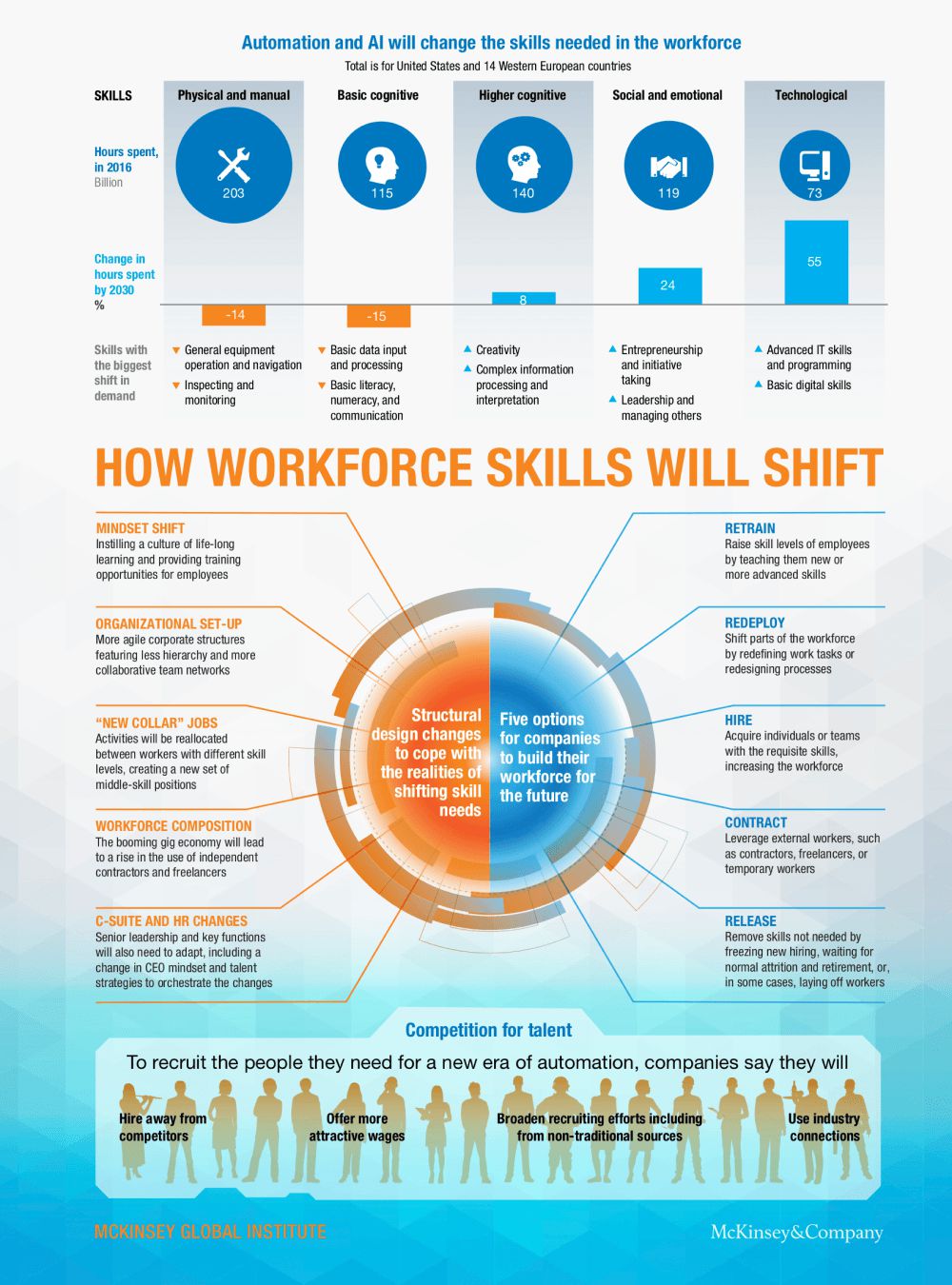Employees want more L&D (eg. masterclasses and lunch and learns) and expect bosses to pay for them

Image: Dr Robyne Hanley-Dafoe leads a masterclass for The Growth Faculty on decreasing anxiety to do better work.
When COVID-19 hit what's the first thing I did?
I did an online business course (in sustainability).
And I'm not alone in the wilderness here.
When the going gets tough, the tough get professional development.
- Learning and development's proven to reduce work stress and increase happiness
- The best online learning platforms are a safe way for employees to adapt to the COVID-19 disruption.
- Research shows training helps individuals, teams and companies develop adaptive expertise.
- Employees feel more valued when offered learning opportunites.
Forbes was reporting that even prior to the pandemic, the amount of time employees spent on learning and development was increasing at a steady clip
Upskilling and reskilling revolution
As far back as 2016, more than half of surveyed workers knew it would become essential throughout their work life to keep up with changes in the workplace.
Now the 2020 LinkedIn Workplace Learning Report predicts an upskilling and reskilling revolution in the next 3-5 years.
It forecasts:
- A shift from instructor-led training to online learning
- Learning and development (L&D) professionals increasingly seen as strategic business partners.
- Learning and development repositioned as the key to growth and innovation.
- Online learning solutions and self-directed learning seen as the top strategic areas of focus for L&D professionals in Australia, Germany, and India.
- Increasing learner engagement as top focus for their U.S. counterparts.
- Closing skills gaps as most important in the U.K.
McKinsey reports:
"With the growth of user-friendly digital-learning platforms, employees will take more ownership of their professional development....such innovations will require companies to devote more resources to training."
In 2021, it's a clear case of learn or lag behind.
Fear of irrelevancy and staying relevant
Stable work is a rarer and rarer commodity.
Employees increasingly fear their skills may have a short shelf life, and they want their company's support to stay relevant.
A recent Seek study showed:
- 67% of employees expected their employers to pay for their upskilling activities.
- Only 25% had participated in formal training in the past year,
- 39% were keen for more.
While many executives seek out traditional degrees such as Bachelors in Business Management, others are looking for shorter online business courses, such as virtual masterclasses and seminars.
Managers stand to get so much upside from supporting and providing professional development, it's something of a no-brainer to provide it to teams, even those working remotely.
Skills and traits needed towards 2030
McKinsey's infographic below predicts future skills and traits needed - many requiring professional development investment.
Over the next decade, companies will need to:
- Install a culture of lifelong learning
- Provide training and raise skills levels of employees
- Adapt and change mindsets of their CEOs and other C-suite executives
- Increase leadership and management skills
- Focus on technological skills, everything from basic to advanced
- Train up more intrapreneurs and innovators
- Encourage learnings in creativity and critical thinking

There's no doubt many of your staff are feeling the strains of these changes, and general work pressure.
An employer who ignores training and learning is also choosing to ignore their 3 key benefits:
- Retention - 94% of employees say they'd stay at a company longer if it invested in their learning development (LinkedIn 2019 Workplace Learning Report)
- Performance - Study shows training and development is a significant motivator for employees.
- Engagement - Research shows significant effect on job satisfaction, organisational commitment, advocacy, pride, intention to stay, and overall employee engagement score.
Of all the employee engagement ideas that work, online L&D is one of the most effective, inexpensive, flexible, and time-effective forms of HR training.
The Growth Faculty staff have been experiencing this first-hand, with our pivot from face-to-face to virtual events. As well, we've had a steep learning curve to bring our community a range of online masterclasses.
Multiple positive effects of training and development
A 3-year UWA CSI study shows investment in training and development improves:
- Employee's role clarity & job knowledge
- Self-confidence
- Better decisions and leadership behaviours
- Reduced costs
- More funding
- Better services
Retaining staff through learning and development investment
Right now scared and stressed managers and staff are assessing their future.
Continuing professional development makes them more likely to want to stay, according to Forbes.
And, McKinsey highlights Nick van Dam's Elevating Learning and Development report which shows a large number of people will need to learn new skills to remain employable.
Team training and development is proven to:
- Attract and retain talent
- Develop people capabilities
- Motivate and engage employees
- Create a values-based culture
- Build an employer brand
"Today, L&D leaders must design and implement interventions that support informal learning, including coaching and mentoring, on-the-job instruction, apprenticeships, leadership shadowing, action-based learning, on-demand access to digital learning, and lunch-and-learn sessions." - McKinsey Elevating Learning and Development report.
From the top: CEOs get that learning is an investment not a cost
Showing nearly a third of CEOs now actively champion learning, LinkedIn's Workplace Learning Report describes the rising impact of the learning and development (L&D) discipline as:
- A leadership and management development engine
- A growth engine for career trajectories and meaningful business impact
- An onboarding pro
- An expert in scaling learning across the organisation
Where to start on your lifelong learning journey
Fast Company says being an "eternal newbie" is critical, and it's important to develop a beginner's mind.
This means seeking out new information and teachings, and being unafraid to experiment with different theories and methods.
How to find the right professional development course or training:
- Look for proven speakers or thought leaders in their field, preferably aligned with respected businesses, institutions or universities.
- Check out which other organisations the training provider has worked with.
- Hone in on what skill-sets your team needs (eg. trust, time management, negotiation, disruption, leadership)
- Read any FAQs and T&Cs.
- Schedule the training course in your calendar to ensure you don't miss it.
- Take notes during the session
- To embed the knowledge, implement learnings as soon as possible, try to teach what you've learned to others, write an article, or do a presentation on the content.
- Write to the training provider with feedback or questions.
Summary
Leadership development and other professional training is on the rise, and agile companies know it. Employes expect their employers will pay to update their skills. They're scared, stressed, and working hard, and they want professional development that's efficient, effective and convenient for them.
Ensure your own team is getting the training they want and in a way that they want it.
If you'd like to increase your professional development in 2021 why not consider becoming a member of The Growth Faculty? One membership, unlimited access to 30 live virtual Time For Transformation masterclasses and the best live virtual events - PLUS year-round leadership content On Demand with videos, podcasts and book summaries. Join a community of knowledge seekers who are inspired by the best. Access $4350+ value for just $398 AUD. See who's up next.


 Australia
Australia
 European Union
European Union
 New Zealand
New Zealand
 United Kingdom
United Kingdom
 United States
United States
 Singapore
Singapore

